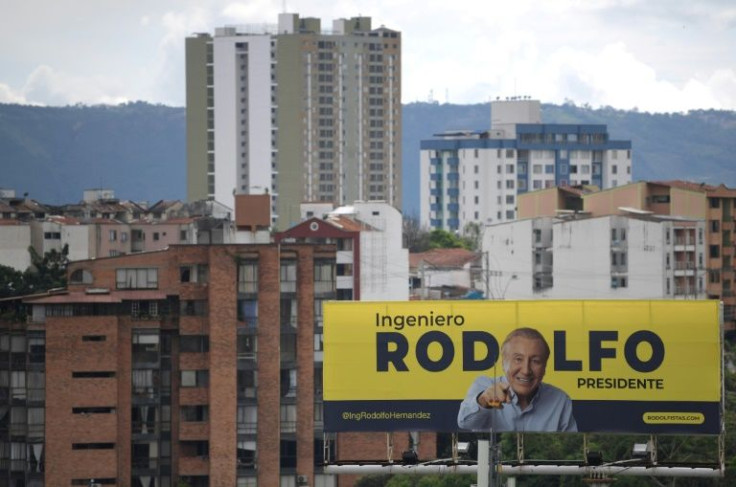Millionaire Presidential Candidate Wary Of Class War In Colombia
Rodolfo Hernandez, a millionaire businessman and ex-mayor under investigation for corruption, has made poverty and government graft the focus of his campaign for the Colombian presidency.
Hernandez, 77, finished in a surprise second place in a first election round on May 29 and will face leftist former Bogota mayor Gustavo Petro in a runoff on June 19.
At a meeting last week with fellow businessmen in the northeastern city of Bucaramanga, his political stronghold, Hernandez warned that growing inequality could lead to a class war in Colombia.
"If these guys (the poor) one day decide to come for us, there won't be enough trees to hang us from," he told industrial-scale palm growers.
"We need to live as brothers. I am not saying equals, because that we will never be, it is impossible. But yes, we must improve the lot of the poor," he said.
Poverty affects nearly 40 percent of Colombia's 50 million people, who largely blame corruption and nepotism for their plight.
In an interview after the meeting, Hernandez told AFP how he sees the problem and what he intends to do about it with his small Anti-Corruption League party holding only two seats on Colombia's near 300-member Congress.
Q: Is there a class struggle in Colombia?
A: "There is no class struggle, but there could be one.
"In a country where 22 million of our 50 million people live in conditions of poverty and extreme misery, it would not be strange for any given political activist to foment a revolt rather than think about how to bring those 22 million into the economic fold. "
Q: How can it be avoided?

A: "By getting politicians to stop stealing. While people pay taxes (politicians) are increasing the country's debt, doing tax reforms and not solving the problems.
"It means these political administrators must be expelled and imports must be reduced in favor of (domestic) job creation...
"Everything is about (global) competitiveness and that is what we have to do. We have the water, we have the people, we have everything, but these politicians don't give them the chance."
Q: Your rival has also proposed limiting imports. What makes you the man to do it?
A: "The others (politicians) have not worked. When have you ever seen a politician working, producing? The politician is fixated on the payroll, applying a form of bureaucracy called nepotism. That is what has destroyed us. I want to make one proviso: Not all politicians are bad, but almost all."
Q: In your opinion, what caused last year's anti-government protests?
A: "This is not a class struggle but about politicians ignoring the demands of the people. What did the people in Cali ask for? Free, high-quality education and jobs. The government did not listen and was pushed until it all exploded and 100 people died.
"In the end, the president agreed to everything they had asked for, but too late. Why did we not act beforehand? It's like in football: anticipation. The government has to anticipate problems, not wait for them to hatch, because then it hits out, and people die."
(Note: According to the UN, 46 people died during the protests, 28 at the hands of the security forces.)
Q: What will you do if you cannot pass laws through Congress?
A: "That is not important as long as we have public opinion... A democratic debate, that is what we need. No violence, only reason and the law. Politicians who feel watched by citizens will approve everything, they are cowards."
© Copyright AFP 2024. All rights reserved.





















